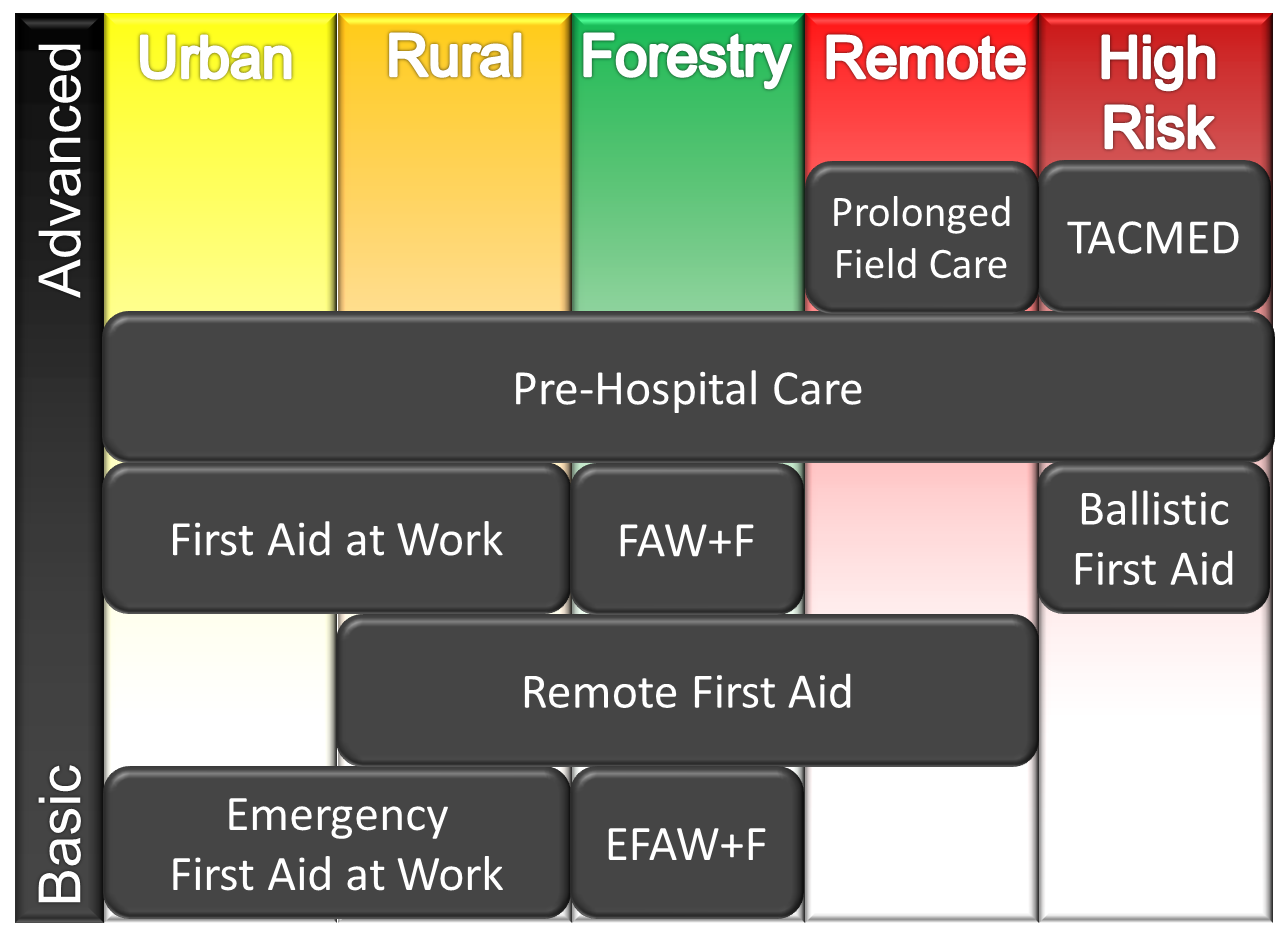Find a course that is right for you
REAL First Aid offer a range of courses to suit your skill level and working environment.
Urban, Rural, Remote or High Risk?
In simple terms, the differences between rural, remote, or high-risk settings are:
A great likelihood of injury or illness
An increased severity of that injury or illness
Complications of the extended period of time to definitive care (e.g. a hospital)
Your First Aid training should reflect, and cater to, these differences.
Traditional first aid courses are designed for low-risk urban settings. As we move away from urbanised areas we encounter increasing limitations on resources compounded with logistical problems in terms of travel and communication. Similar problems can be encountered in High-Risk settings (be they industrial environments or areas of conflict) regardless of their distance from urban centers.
Likelihood & Severity
Two of the main reasons we venture into rural, remote or high-risk areas are play and work. We tend to either seek thrill in wild places or find ourselves in hostile environments due to the nature of our work.
Whether you are a snowboarder, tree surgeon, engineer in the oil or gas sector or security operative abroad, several assumptions can be made about the nature of illnesses and injuries that can be expected in these environments:
The likelihood of illness or injury is greater - due to the nature of the activity you are undertaking.
The severity of that illness or injury is greater - due to the nature of the environment you are operating in.
The situation is compounded by the extended period of time to definitive care meaning the responder must be capable of dealing with the casualty for longer.
Basic or Advanced?
A basic first aid course is achievable by anyone. The Emergency First Aid at Work course is a 6 hour, basic level of training required for employees. This course is appropriate for anyone who wants a basic understanding of simple, life-saving skills. This course covers:
A universal procedure for managing incidents
CPR and Unconsciousness
Bleeding wounds
For those who want to be able to manage a wider range of injuries as well as a few common medical conditions, our Remote First Aid course is a practical, scenario-based course designed for those who work or play off the beaten track. Including:
Bone / Joint Injuries
Head, neck, chest and pelvic injuries
Common medical conditions
Heat & Cold problems
Triage
The First Aid at Work course is the benchmark for First Aid training in industry and commerce. REAL First Aid specialise in corporate training and can tailor this industry-standard course to the needs and working environment of private clients. The course includes:
Industrial injuries
Burns
Poisons
Legislation and The law
Forestry Courses
Since 2011, the Forestry Commission has required those who work in forestry and arboriculture to obtain training that not only follows the core content of the industry-standard EFAW and FAW courses but with additional content, specifically:
Severe bleeding
Crush injury
Hypothermia
Lyme Disease
We incorporate these topics (including the use of tourniquets and haemostatics and other remote protocols) on our "EFAW+F" and "FAW+F" Forestry First Aid courses.
Pre-Hospital Care
As an Accredited Center for Qualifiactions Network we are pleased to offer the Level 3 Award for First Responders and Level 3 Award for the First Person on Scene - International for those who require or prefer the reassurance of advanced skills and interventions. Other similar courses exist, such as FPOS and FREc, find out why we chose the First Responder as our preferred course here.
'Advanced' First Aid is often misinterpreted as more equipment or invasive skills. If poorly taught, both can be inappropriate at best or highly dangerous at worst.
We consider advanced First Aid as a deeper understanding and better decision-making, including:
Advanced assessment skills
Advanced diagnostic skills
A better understanding of illnesses and injuries
A wider selection of techniques
An awareness of - but not a reliance on - a wider range of equipment
Longer-term care before handover
Advanced handover technique
Specialist Course
We can provide specialist training for those who operate further afield or in high-hazard environments. These courses are generally only available to discrete groups and organisations and are currently not available to individuals.
Contact us to find out more

